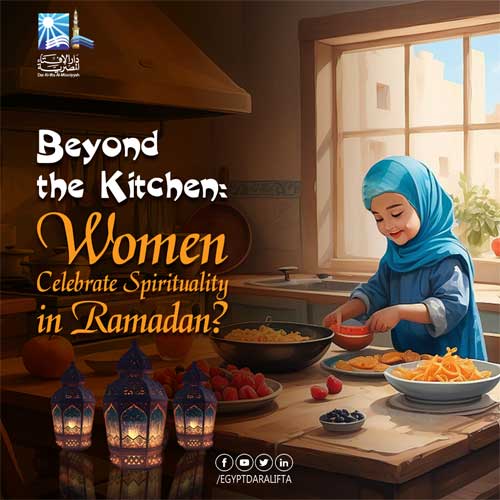Beyond the Kitchen: Women Celebrate Spirituality in Ramadan?

Commemorating International Women's Day (IWD) coincides this year (1445 A.H) with the spiritual anticipation of the upcoming blessed month of Ramadan. During this sacred 30-day unique program of fasting and striving to improve one's worship, Muslim women play a crucial role both within and beyond the confines of the home. This role raises a frequently pondered question: Does a Muslim woman experience the same spiritual elevation as a man, despite dedicating much of her time to household chores and meal preparation in the kitchen? Having this on mind, it is clear from the earliest sources that women's role has never been restricted solely to the domestic sphere.
This question is, in fact, the result of an ignorant fussing of social and cultural traditions with the noble teachings of Islam. In other words, customs and traditions are unfortunately masquerading as Islam and are placing gender equity at stake. Equity, in Islam, is used to establish justice and overall equality in all rights and responsibilities of both genders. It allows for the possibility of variations in specific aspects within the overall balance and equality. God the Almighty explains this meaning of ‘equity’ in the Qur’an: “Whoever does righteousness, whether male or female, while they are believers, We will surely cause them to live a good life, and We will surely give them their reward [in the Hereafter] according to the best of what they used to do” (Qur'an 16:97)."
Intention (Niyyah) is the key
For many women, juggling household chores alongside the additional spiritual practices of Ramadan may seem overwhelming. However, Islam emphasizes the importance of intention (Niyyah) in all actions. The Prophet (peace be upon him) said, “Actions are Judged by intentions…”[1] By reframing mundane tasks such as cooking, cleaning, and caring for family members as acts of worship, women can integrate their domestic duties seamlessly into their spiritual routines.
God the Almighty says in the Qur’an, “Surely for Muslim men and women, believing men and women, devout men and women, truthful men and women, patient men and women, humble men and women, charitable men and women, fasting men and women, men and women who guard their chastity, and men and women who remember God often—for all of them God has prepared forgiveness and a great reward” (Quran 33: 35).
God the Almighty addresses the believers using the words “believing men and women” to emphasize the equity between both genders in regards to virtues and merits. Both men and women equally need the spiritual nourishment, and both genders are equal before God in regards to acts of worship and reward. God the Almighty says, "Verily the most honored of you (male and female) in the sight of God is (he/she who is) the most righteous of you” (Qur'an 49:13). The Prophet (peace and blessings be upon him) said, “Surely, in the body there is a small piece of flesh; if it is good, the whole body is good, and if it is corrupted, the whole body is corrupted, and that is surely the heart.”[2]
The Prophet's words teach us that every person, male or female, has to work hard to meet their Lord with a sound heart. What is sad today is that women are still denied access to mosques in some communities, and if they are allowed in, they are kept in the most neglected part inside the mosque. The Prophet's tradition in which he said that it is better for a woman to pray in her house is misinterpreted. The proper interpretation of this tradition is that due to the fact that women are busy most of times with their children and housework, the Prophet made it easy for whoever among them cannot make it to the mosque to pray at home. By doing this they would not receive any less reward than a male praying in the mosque. However, this meaning of mercy is misinterpreted into gender discrimination! The cultural traditions changed the clear teachings of Islam and neglected the words of the Prophet, “Do not prevent women from going to the mosque.” According to the practice of generations of Muslims from among the predecessors and successors, the mere presence of males and females in the same place is not prohibited in itself. Rather, the prohibition concerns the manner of their gathering and if it contradicts the rulings of Islamic law then it becomes disliked or completely prohibited.
Splendid Spiritual Growth and Reward
Abu Hurairah (May God be pleased with him) said: The Messenger of God (peace be upon him) said, "O people! God is Pure and, therefore, accepts only that which is pure.”[3]
In Islam, every action performed with sincerity and devotion is believed to be rewarded by God. Thus, women who diligently fulfill their domestic duties during Ramadan while maintaining their spiritual practices are promised immense rewards.
Cooking iftar (the meal to break the fast) for the family becomes an act of charity (sadaqah) when done with the intention of pleasing God and nourishing loved ones. The Prophet (peace be upon him) said, “Whoever gives food for a fasting person to break his fast, he/she will have a reward like theirs, without that detracting from their reward in the slightest.”[4] Similarly, cleaning and organizing the home can be seen as acts of worship, creating a peaceful and conducive environment for spiritual reflection and prayer.
Moreover, the act of fasting itself holds great significance for women in Ramadan. Despite the physical challenges, fasting provides an opportunity for spiritual purification, self-discipline, and empathy towards the less fortunate. Women who fast with sincerity are promised forgiveness of sins and increased closeness to God. Abu Hurairah reported: The Messenger of God (peace and blessings be upon him) said, “If a woman prays her five obligatory prayers, fasts the month of Ramadan, guards her chastity, and obeys her husband (in that which pleases God), she will enter Paradise from any gate she wishes.”[5]
Empowerment through Spiritual Growth
Ramadan presents women with a unique opportunity to balance their domestic responsibilities with their spiritual pursuits, thereby reaping abundant rewards in both this world and the Hereafter. By approaching household chores with intentionality and incorporating acts of worship into their daily routines, women not only fulfill their roles as homemakers but also grow spiritually and find empowerment in their faith. As the blessed month approaches, let us celebrate the invaluable contributions of women and strive to support them in their journey towards spiritual fulfillment and success. It suffices for Muslim men to learn that our beloved Prophet (peace be upon him) used to attend to his household needs at home and help around the house. Al-Aswad bin Yazid narrated: I asked `Aisha "What did the Prophet use to do at home?" She said, "He used to work for his family (by helping around the house), and when he heard the Adhan (call to the prayer), he would go out."[6]
[1] Authentic Hadith: Sunnan An-Nassa’i
[2] Bukhari.
[3] Muslim.
[4] Ibn Majah
[5] Ibn Hibban
[6] Bukhari
 Arabic
Arabic French
French Deutsch
Deutsch Urdu
Urdu Pashto
Pashto Swahili
Swahili Hausa
Hausa

